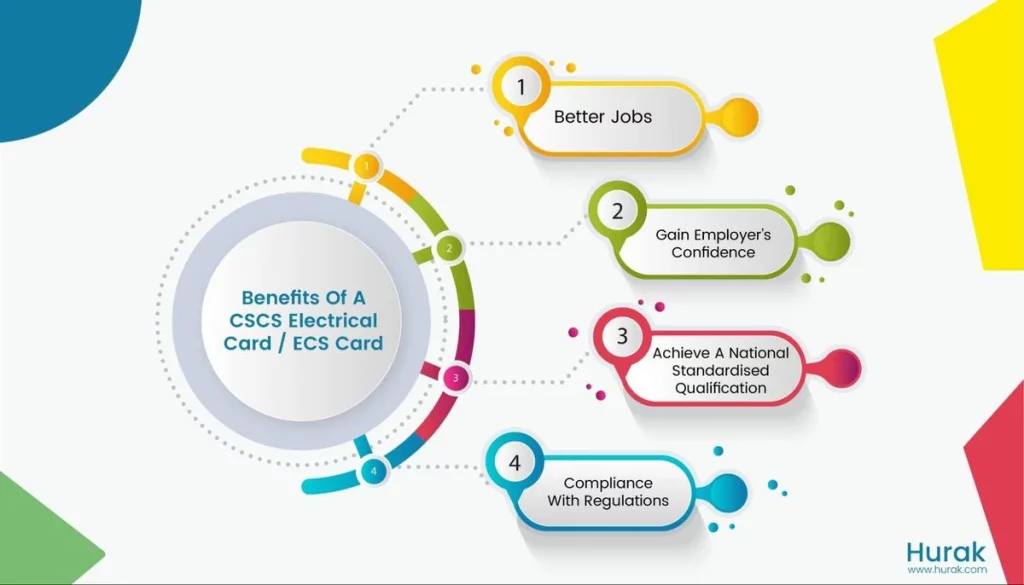Although construction workers, supervisors, and managers need CSCS cards to work on construction sites, the criteria for specialised workers like electricians are different.
For electricians to prove that they have the necessary skills to perform the job, they need a CSCS Electrical Card.
What is a CSCS Electrical Card / ECS Card?
Just like many other industries in the UK that require qualification cards, such as CSCS cards for the construction industry, ECS is a card for you to work in the electrical industry. It’s often called CSCS Electrical Card. This card shows that you’re capable of working in the electrical industry and are authorised to work on a site. The card has all the information that shows your identity, qualified status and occupation.
Electrotechnical Certification Scheme or ECS is an occupational card scheme that issues ECS cards for electrotechnical workers in the UK. ECS has a card for you for every stage of your career in the electrical industry whether you’re a trainee or site manager.
The ECS card scheme functions and is validated across the entire UK including the countries, England, Wales and Northern Ireland. But, Scotland has a different process for this.
What is the Difference between a CSCS Card and an ECS Card?
The main difference between a CSCS card and an ECS card is that a CSCS card is for the construction industry and an ECS card is for the electrical industry.
A CSCS card is a card type that is suitable to work on a construction site only. Similarly, other site occupations require other kinds of cards to prove the workers’ capability in a particular site. Although there are different types of cards for different industries, they are all affiliated with CSCS (Construction Skills Certification Scheme) and so they hold the same standard.
Most construction jobs are advertised with a CSCS card requirement, however, a CSCS card on its own won’t allow you to work as an electrician. For getting a job in the electrical industry you require an ECS card.
You might get confused when you see an electrical site job advertisement requiring a CSCS card for the electrical job. However, it’s the ECS card you need for that job.

Types of Electrical Cards
If you’re aspiring to become an ECS or electrical cardholder but aren’t aware of which type of ECS card you should go for then don’t worry! Here are listed all the CSCS Electrical Card types that fit with your experience, skill, and qualification:
ECS Apprentice Card
The ECS Apprentice Card is a type of electrical or ECS card that is designed for those who are taking an electrical or electronic apprenticeship. It is also known as a White Card.
You can get this card from your training provider, as in most cases they arrange it for you. They also help you register with JIB. The JIB offers pre-apprentice and Apprentice Cards to students who are aspiring to start a career in the electrical industry.
First, you will start your apprentice employment with a recognised training provider. There, you will receive the ECS Apprentice Card that allows you to gain first-hand experience working on an electrical site. Additionally, it allows the company to understand your work ethic and how best you have understood the expectations of the company.
Once you have acquired a pre-apprentice card, you can apply for an Apprentice Card. This card will allow you to gain industry experience in support of your training.
To be eligible for an Apprentice Card, you need to be registered on an apprenticeship or advanced apprenticeship. Along with that you need a copy of your Training Agreement and passed the ECS HS&E Test.
ECS Trainee Card
ECS Trainee Cards are for people who are not doing an apprenticeship but are in a formal JIB industry training programme. The training usually has three stages, and each of these has its own rules you need to follow.
Stage 1: You start here. Show evidence of employer sponsorship and registration in a training program. Pass the ECS HS&E Test to move to stage 2.
Stage 2: Complete stage 1 and show your certificate. Also, meet the requirements from stage 1.
Stage 3: Fulfill previous requirements. Show evidence of working towards AM2 and Level 3 NVQ in a related field, and passing stage 2.
ECS Gold Card
The ECS Gold Card makes you a qualified electrician. And so, you can work unsupervised with electrical and electronic equipment on sites. The Gold Card covers all jobs related to electrical work, as well as jobs in fire detection and alarms, data communications, and emergency and security systems.
To obtain this card, you must complete the NVQ level 3 qualification in your relevant field or area of expertise. To apply for this card, it doesn’t matter when you have received this qualification.
ECS Black Card
The ECS Black Card is for workers who have managerial jobs in the industry. Different roles qualify for this card, such as Electrical Site Manager, Electrical Contract Manager, Project Manager, Site Manager, and Contract Manager.
With a Black Card, you can apply for specific industry-related jobs that match your qualification and experience.
To be eligible for an ECS Black Card, below are the two pathways:
- If you’re currently working in one of the mentioned roles and already have a Gold Card, you can automatically qualify for the Black Card.
- Complete a relevant Level 4 Management qualification. This could be an undergraduate degree, a BTEC, or a JIB-recognised training course.
Professionally Qualified Person ECS Card – White Card
The ECS Professionally Qualified (PQP) Card is issued to those individuals who are part of professional institutions and work in specialised electrotechnical disciplines. Also, if you work in such a specialised discipline, but are not involved in electrical installation work and only work in a supporting capacity, then you are eligible for an ECS PQP Card.
To obtain an ECS Professionally Qualified Person (PQP) Card, you need to:
- Be a member of an electrotechnical professional institute like The Institute of Engineering and Technology (IET).
- Pass the ECS Health, Safety, and Environmental Assessment.
Academically Qualified Person ECS Card
An ECS Academically Qualified (AQP) Card is issued to those managers and operatives who have completed a degree in electrotechnical engineering. If you have qualifications in any of the following disciplines, then you are eligible for an ECS AQP Card:
- Electrical Engineering (Power)
- Electrical Engineering (Electronics)
- Electrical Engineering (Instrumentation)
- Electrical Engineering (Systems)
- Electrical Engineering (Building Services)
- Electrical Engineering (Environmental)
- Electrical Engineering (Communication)
- Electrical Engineering (Control)
To obtain an ECS Academically Qualified Person (AQP) Card, you need to:
- Have a UK electrical engineering or electrotechnical degree or higher. Alternatively, you can also have a UK further education qualification at level 4 or 5 (like HND or HNC) in the electrotechnical discipline.
- Pass the current ECS Health, Safety, and Environmental Assessment.
Which CSCS Electrical Card Do I Need?
Considering the above discussed card types, you must see what qualifications and experience you have, and then get the relevant card accordingly.
Moreover, the ECS Card is known by different names in other parts of the UK. In England and Wales, the CSCS Electrical Card is known as an ECS Card. However, in Scotland, these cards are known as Scottish Joint Industry Board (SJIB) Cards. Joint Industry Board (JIB) is the issuing authority on the ECS Cards, thus, they are also known as JIB Cards.
Essentially, these cards are the same. However, you must choose the right ECS card for you depending on your expertise in electrical work.
How Long Does an ECS Card Last?
An ECS card is valid for three years. However, some ECS cards have a shorter expiry duration. ECS Trainee Cards are valid for 24 months and Experience Worker and Provisional Cards are valid for 18 months.
Frequently Asked Questions (FAQs)
Can anyone get an ECS card?
If you’re in an electrotechnical profession in the UK, you can apply for an ECS Card.Whether you’re an apprentice going through an industry-regulated training programme or a highly-skilled professional looking for better employment opportunities, you’re eligible for applying for an ECS card.
How Do You Pay for ECS?
When applying online, the system automatically calculates the amount and then prompts you to pay either through a credit or a debit card.
What is an ECS Platinum Card?
ECS Platinum Cards are issued to those individuals who have NVQ level 3 or above qualifications within their occupation such as site managers, contracts managers, etc.
Final Word
The CSCS Electrical Card is very important for people working in electrical jobs. It shows that they are skilled and safe workers. Having this card helps you get better jobs and makes employers trust you.
Getting the CSCS Electrical Card is an important requirement if you want to work in the electrical industry. It gives you more opportunities, helps you understand the rules, and makes work safer. So, don’t wait – get your CSCS Electrical Card now to build a successful career in electrical work.




